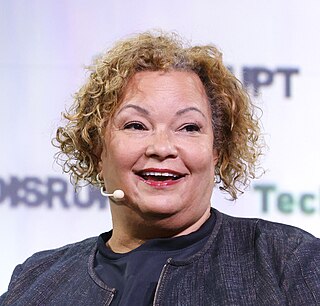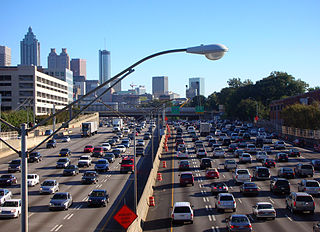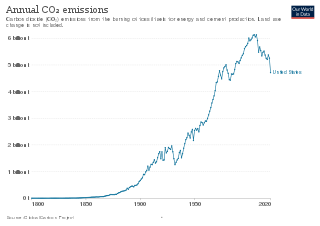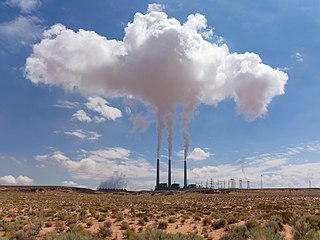
Four main lines of evidence support attribution of recent climate change to human activities: Firstly, a physical understanding of the climate system: greenhouse gas concentrations have increased and their warming properties are well-established. Secondly, there are historical estimates of past climate changes suggest that the recent changes in global surface temperature are unusual. Thirdly, computer-based climate models are unable to replicate the observed warming unless human greenhouse gas emissions are included. And finally, natural forces alone cannot explain the observed warming.

The Environmental Protection Agency (EPA) is an independent agency of the United States government tasked with environmental protection matters. President Richard Nixon proposed the establishment of EPA on July 9, 1970; it began operation on December 2, 1970, after Nixon signed an executive order. The order establishing the EPA was ratified by committee hearings in the House and Senate.

Stephen Lee Johnson is an American politician who served as the Administrator of the Environmental Protection Agency (EPA) under President George W. Bush during the second term of his administration. He has received the Presidential Rank Award, the highest award that can be given to a civilian federal employee.

Lisa Perez Jackson is an American chemical engineer who served as the administrator of the United States Environmental Protection Agency (EPA) from 2009 to 2013. She was the first African American to hold that position.
Massachusetts v. Environmental Protection Agency, 549 U.S. 497 (2007), is a 5–4 U.S. Supreme Court case in which Massachusetts, along with eleven other states and several cities of the United States, represented by James Milkey, brought suit against the Environmental Protection Agency (EPA) represented by Gregory G. Garre to force the federal agency to regulate the emissions of carbon dioxide and other greenhouse gases (GHGs) that pollute the environment and contribute to climate change.
Susan Elaine Dudley is an American academic who served as Administrator of the Office of Information and Regulatory Affairs (OIRA), Office of Management and Budget in the administration of George W. Bush. As such, Dudley was the top regulatory official at the White House.

The United States produced 5.2 billion metric tons of carbon dioxide equivalent greenhouse gas (GHG) emissions in 2020, the second largest in the world after greenhouse gas emissions by China and among the countries with the highest greenhouse gas emissions per person. In 2019 China is estimated to have emitted 27% of world GHG, followed by the United States with 11%, then India with 6.6%. In total the United States has emitted a quarter of world GHG, more than any other country. Annual emissions are over 15 tons per person and, amongst the top eight emitters, is the highest country by greenhouse gas emissions per person. However, the IEA estimates that the richest decile in the US emits over 55 tonnes of CO2 per capita each year. Because coal-fired power stations are gradually shutting down, in the 2010s emissions from electricity generation fell to second place behind transportation which is now the largest single source. In 2020, 27% of the GHG emissions of the United States were from transportation, 25% from electricity, 24% from industry, 13% from commercial and residential buildings and 11% from agriculture. In 2021, the electric power sector was the second largest source of U.S. greenhouse gas emissions, accounting for 25% of the U.S. total. These greenhouse gas emissions are contributing to climate change in the United States, as well as worldwide.

The environmental policy of the United States is a federal governmental action to regulate activities that have an environmental impact in the United States. The goal of environmental policy is to protect the environment for future generations while interfering as little as possible with the efficiency of commerce or the liberty of the people and to limit inequity in who is burdened with environmental costs. As his first official act bringing in the 1970s, President Richard Nixon signed the U.S. National Environmental Policy Act (NEPA) into law on New Years Day, 1970. Also in the same year, America began celebrating Earth Day, which has been called "the big bang of U.S. environmental politics, launching the country on a sweeping social learning curve about ecological management never before experienced or attempted in any other nation." NEPA established a comprehensive US national environmental policy and created the requirement to prepare an environmental impact statement for “major federal actions significantly affecting the quality of the environment.” Author and consultant Charles H. Eccleston has called NEPA, the world's “environmental Magna Carta”.
The Pacific Legal Foundation (PLF) is an American nonprofit public interest legal organization established for the purpose of defending and promoting individual and economic freedom. PLF attorneys provide pro bono legal representation, file amicus curiae briefs, and hold administrative proceedings with the stated goal of supporting property rights, equality before the law, freedom of speech and association, economic liberty, and the separation of powers. The organization is the first and oldest libertarian public interest law firm, having been founded in 1973.

The Clean Air Act (CAA) is the United States' primary federal air quality law, intended to reduce and control air pollution nationwide. Initially enacted in 1963 and amended many times since, it is one of the United States' first and most influential modern environmental laws.

The climate change policy of the United States has major impacts on global climate change and global climate change mitigation. This is because the United States is the second largest emitter of greenhouse gasses in the world after China, and is among the countries with the highest greenhouse gas emissions per person in the world. In total, the United States has emitted over 400 billion metric tons of greenhouse gasses, more than any country in the world.

Air quality laws govern the emission of air pollutants into the atmosphere. A specialized subset of air quality laws regulate the quality of air inside buildings. Air quality laws are often designed specifically to protect human health by limiting or eliminating airborne pollutant concentrations. Other initiatives are designed to address broader ecological problems, such as limitations on chemicals that affect the ozone layer, and emissions trading programs to address acid rain or climate change. Regulatory efforts include identifying and categorising air pollutants, setting limits on acceptable emissions levels, and dictating necessary or appropriate mitigation technologies.

John C. Dernbach is a nationally and internationally recognized authority on sustainable development, climate change, and environmental law. He is Commonwealth Professor of Environmental Law and Sustainability at Widener University Commonwealth Law School and Director of its Environmental Law and Sustainability Center.
American Electric Power Company v. Connecticut, 564 U.S. 410 (2011), was a United States Supreme Court case in which the Court, in an 8–0 decision, held that corporations cannot be sued for greenhouse gas emissions (GHGs) under federal common law, primarily because the Clean Air Act (CAA) delegates the management of carbon dioxide and other GHG emissions to the Environmental Protection Agency (EPA). Brought to court in July 2004 in the Southern District of New York, this was the first global warming case based on a public nuisance claim.
The, United States Environmental Protection Agency (EPA) began regulating greenhouse gases (GHGs) under the Clean Air Act from mobile and stationary sources of air pollution for the first time on January 2, 2011. Standards for mobile sources have been established pursuant to Section 202 of the CAA, and GHGs from stationary sources are currently controlled under the authority of Part C of Title I of the Act. The basis for regulations was upheld in the United States Court of Appeals for the District of Columbia in June 2012.

Energy Tax Prevention Act, also known as H.R. 910, was a 2011 bill in the United States House of Representatives to prohibit the United States Environmental Protection Agency (EPA) from regulating greenhouse gases to address climate change. On April 7, 2011, the bill passed the House by a vote of 255 to 172. The bill died in January 2013 with the ending of the Congressional session.
Utility Air Regulatory Group v. Environmental Protection Agency, 573 U.S. 302 (2014), was a US Supreme Court case regarding the Environmental Protection Agency's regulation of air pollution under the Clean Air Act.

The Clean Power Plan was an Obama administration policy aimed at combating anthropogenic climate change that was first proposed by the Environmental Protection Agency (EPA) in June 2014. The final version of the plan was unveiled by President Obama on August 3, 2015. Each state was assigned an individual goal for reducing carbon emissions, which could be accomplished how they saw fit, but with the possibility of the EPA stepping in if the state refused to submit a plan. If every state met its target, the plan was projected to reduce carbon emissions from electricity generation 32% by 2030, relative to 2005 levels, as well as achieving various health benefits due to reduced air pollution.

Climate change litigation, also known as climate litigation, is an emerging body of environmental law using legal practice to set case law precedent to further climate change mitigation efforts from public institutions, such as governments and companies. In the face of slow politics of climate change delaying climate change mitigation, activists and lawyers have increased efforts to use national and international judiciary systems to advance the effort. Climate litigation typically engages in one of five types of legal claims: Constitutional law, administrative law, private law (challenging corporations or other organizations for negligence, nuisance, etc., fraud or consumer protection, or human rights.
West Virginia v. Environmental Protection Agency, 597 U.S. ___ (2022), is a landmark decision of the U.S. Supreme Court relating to the Clean Air Act, and the extent to which the Environmental Protection Agency (EPA) can regulate carbon dioxide emissions related to climate change.











